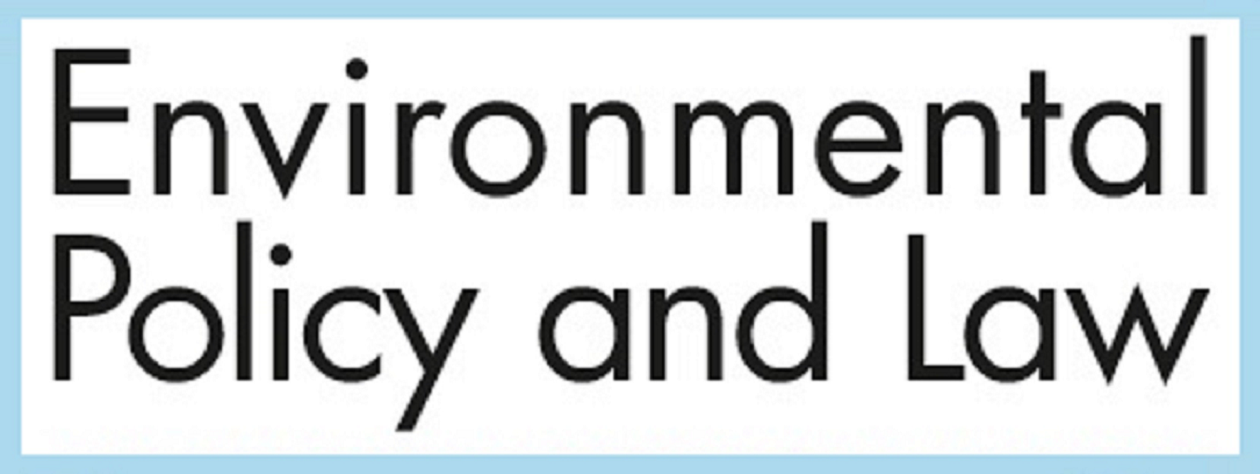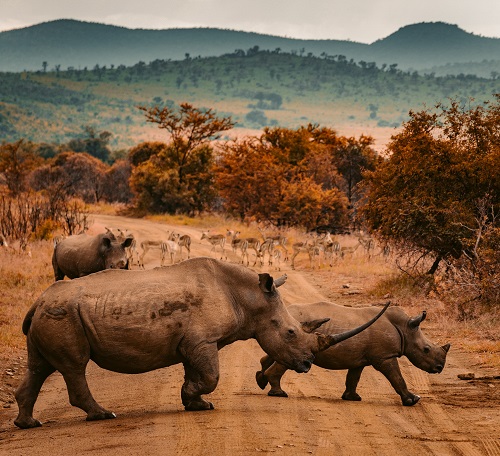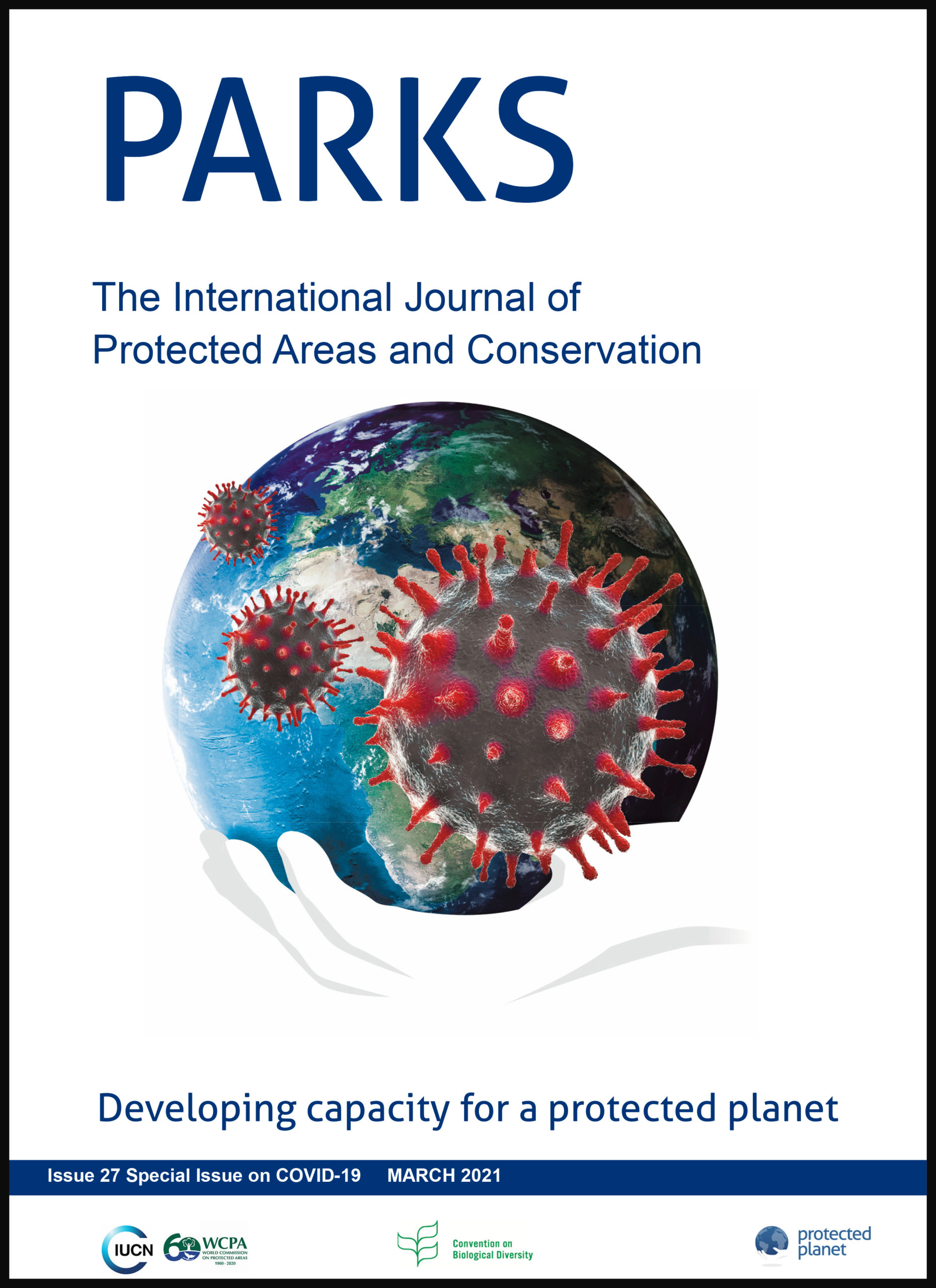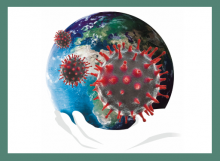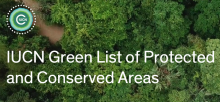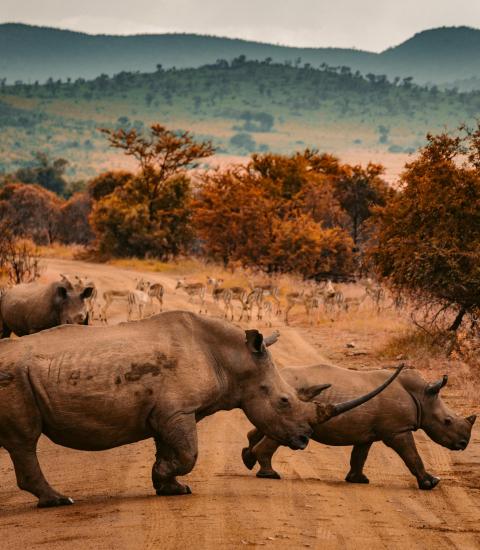
[Posted by: Carmel McNamara]
Gland, Switzerland – The pandemic has significantly impacted nature conservation around the globe, including job losses among protected area rangers, reduced anti-poaching patrols and environmental protection rollbacks, according to a collection of new research papers published in a special issue of PARKS: The International Journal of Protected Areas and Conservation, published by the IUCN World Commission on Protected Areas.
“While the global health crisis remains priority, this new research reveals just how severe a toll the COVID-19 pandemic has taken on conservation efforts and on communities dedicated to protecting nature. Let us not forget that only by investing in healthy nature can we provide a solid basis for our recovery from the pandemic, and avoid future public health crises,” said IUCN Director General Dr. Bruno Oberle.
Conservation efforts in Africa and Asia were most severely affected, according to a synthesis of surveys on the impacts of the pandemic on protected area operations included in the collection. More than half of protected areas in Africa reported that they were forced to halt or reduce field patrols and anti-poaching operations as well as conservation education and outreach. A quarter of protected areas in Asia also reported that conservation activities had been reduced. In Latin and North America, Europe, and Oceania most protected areas were able to maintain core operations despite closures and losses of tourism revenue.
The pandemic also affected the livelihoods of protected area rangers and their communities. A survey of rangers in more than 60 countries found that more than one in four rangers had seen their salary reduced or delayed, while 20% reported that they had lost their jobs due to COVID-19-related budget cuts. Rangers from Central America and the Caribbean, South America, Africa and Asia were more strongly affected than their peers in Europe, North America, and Oceania.
To shed light on the impacts of the COVID-19 pandemic on environmental policy, the special issue of PARKS analyzed economic stimulus packages and other relevant government policies that were implemented or advanced between January and October 2020. It identified some positive examples of economic recovery packages explicitly benefiting Protected and Conserved Areas (PCAs) or scaling up environmental protections; for example, eight countries in the European Union have earmarked funding to expand or better protect PCAs, including for natural capital and the circular economy. Kenya, Japan, Pakistan and New Zealand have also included nature in their stimulus packages. While 17 countries have maintained or increased their support for PCAs, 22 countries have rolled back protections in at least 64 cases in favor of unsustainable development including road construction or oil and gas extraction in areas designated for conservation.
“Protected and conserved areas are an essential conservation strategy - they help ensure the long-term health of nature, people and livelihoods. It’s encouraging to see the conservation of nature take a priority in some COVID-19 recovery efforts,” said the lead author of the study on impacts of stimulus packages, Rachel Golden Kroner of Conservation International. “We cannot allow the current crisis to further jeopardize our natural environment. If we are to build a sustainable future, rollbacks of environmental protections must be avoided, and recovery measures need to be planned in a way that not only avoids negative impacts on biodiversity, but charts a more sustainable and equitable way forward.”
Special issue focusing of COVID-19
The special issue of PARKS, which was published on March 11, provides the most comprehensive synthesis to date of research into the links between and impacts of COVID-19 on nature conservation. In addition to 11 peer-reviewed scientific papers, the issue also contains opinion articles by environmental leaders including: IUCN Director General Dr. Bruno Oberle; former President of Colombia and winner of the Nobel Peace Prize, Juan Manuel Santos; former President of Ireland and former UN High Commissioner for Human Rights, Mary Robinson; biochemist and winner of the Nobel Prize for medicine, Sir Richard Roberts; Executive Secretary of the United Nations Convention on Biological Diversity, Elizabeth Maruma Mrema; and the CEO and Chairperson of the Global Environment Facility, Carlos Manuel Rodríguez.
"Investing in nature conservation and restoration to prevent the future emergence of zoonotic pathogens such as coronaviruses costs a small fraction of the trillions of dollars governments have been forced to spend to combat COVID-19 and stimulate an economic recovery. To do so will also safeguard jobs, human health, incomes and essential natural resources for billions of people. We cannot say we are building back better unless we do so whilst also protecting the natural world,” said Carlos Manuel Rodríguez, CEO and Chairperson of the Global Environment Facility.
###
NOTES TO EDITORS
Special Issue on COVID-19
PARKS: The International Journal of Protected Areas and Conservation, Volume 27 (March 2021)
Full open access issue available at: parksjournal.com/parks-27-si-march-2021
The PARKS special issue is an initiative of the COVID-19 and Protected Areas Task Force of the IUCN World Commission on Protected Areas. For more information, please visit the task force website at: iucn.org/commissions/world-commission-protected-areas/our-work/covid-19.
View the original IUCN press release here.
Contact
For more information, please contact IUCN Press Office (+41 79 536 0117, press@iucn.org).
About the IUCN
International Union for Conservation of Nature (IUCN) is a membership union composed of both government and civil society organizations. It harnesses the experience, resources, and reach of its more than 1,400 member organizations and the input of more than 17,000 experts. This diversity and vast expertise makes IUCN the global authority on the status of the natural world and the measures needed to safeguard it. iucn.org
About the IUCN World Commission on Protected Areas
IUCN's World Commission on Protected Areas (WCPA) is the world's premier network of protected area expertise. It is administered by IUCN's Global Programme on Protected Areas and has over 2,500 members, spanning 140 countries. WCPA works by helping governments and others plan protected areas and integrate them into all sectors; by providing strategic advice to policy makers; by strengthening capacity and investment in protected areas; and by convening the diverse constituency of protected area stakeholders to address challenging issues. For more than 50 years, IUCN and WCPA have been at the forefront of global action on protected areas. iucn.org/commissions/world-commission-protected-areas
About PARKS
PARKS: The International Journal of Protected Areas and Conservation is published by IUCN’s WCPA. It is published twice a year as an online, open access, and peer reviewed journal. The language is English, with abstracts in French and Spanish. PARKS does not charge article processing charges or submission fees. It is indexed in Scopus and is listed in the Directory of Open Access Journals. parksjournal.com
